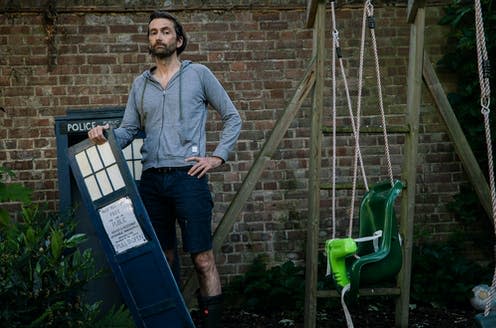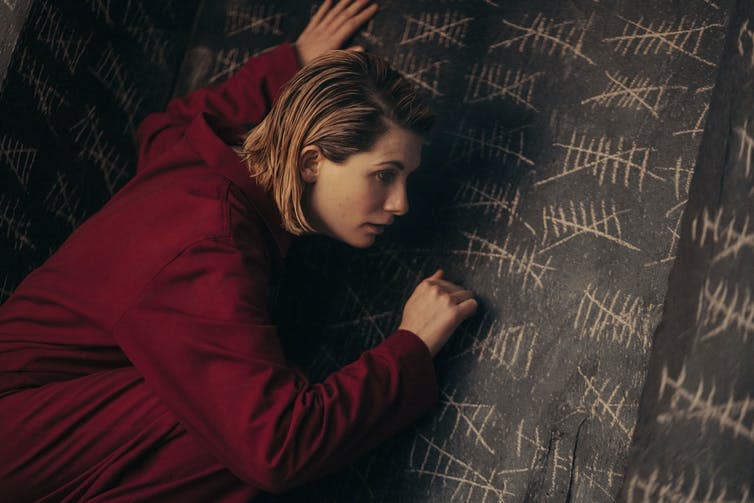Doctor Who: travelling in time and space even under lockdown

Back in March, as the UK went into national lockdown, popular television’s social media “watchalongs” emerged as a major social phenomenon, bringing together audiences across the country and the globe. Now, like the virus itself, these watchalongs are back – with, for example, former Doctor Who star David Tennant joining fans on Twitter for simultaneous commentary on one of his scariest adventures to mark Halloween.
The BBC’s Doctor Who has proven particularly suited to these online events, many coordinated and produced by superfan and assistant editor of Doctor Who Magazine Emily Cook. The show has united its followers in mass viewing events supported by live online commentaries from the show’s stars and writers, including such high-profile figures as Neil Gaiman, Mark Gatiss and Richard Curtis.
As well as series regulars Matt Smith, David Tennant, Karen Gillan, Catherine Tate and John Barrowman, former guest stars Bill Nighy, Sacha Dhawan and Michael Sheen have also take part in these live “tweet-alongs”.
These events have expanded not only to include viewings of episodes of Doctor Who itself, but also of its spin-off show Torchwood and the 2013 biopic of its first star, William Hartnell, An Adventure in Space and Time.
Former showrunners Davies and Moffat, and current showrunner Chris Chibnall have produced new online content, short stories and dramatic monologues and even a poem. Some of these have been published online as text, and some performed through readings, puppetry and animations voiced by actors involved in the show.
The series’ writers have provided us with prequels to the histories of some of the programme’s best-loved characters, including the immediate back-stories of the ninth and 13th Doctors, and supplied a new introduction to the show’s epic 50th anniversary special.
So prolific has this new writing been that on November 5 the BBC is publishing a collection of much of this material in aid of its annual Children in Need telethon entitled Doctor Who: Adventures in Lockdown.
Support and reassurance
In character as the current Time Lord, Jodie Whittaker has performed a reassuring video message to families in lockdown and one advising on social distancing.
Ten of the actors to have played various incarnations of the Doctor – from Tom Baker in the 1970s to 2020’s Jo Martin – also participated in a special message in support of NHS workers as part of the BBC’s Big Night In fundraising show at the end of April.
The BBC has created a “Whovian” educational tool to support families with their home-schooling needs. Meanwhile, with production of the 2021 series delayed, it has launched a massive multimedia adventure (in novels, comics, audio plays and online animations) entitled Time Lord Victorious. Serendipitously, the corporation had already completed production on its latest Doctor Who yuletide special before coronavirus hit – so at least one aspect of Christmas won’t be ruined.

The show’s fans have matched these efforts by organising their own online events, virtual conventions involving interviews with the programme’s stars and production teams, old and new. Fans have even posted their own versions of their favourite scenes from the series in an online project called “Homemade Who”.
BBC proves its value
This has come at a time when the BBC has been under enormous political and financial pressure: talk of decriminalising non-payment of the licence fee or scrapping it altogether and turning the broadcaster into a subscription service. Yet you could say that Doctor Who has played a minor role in the revival of the corporation’s fortunes since the pandemic hit Britain.
In the first week of national lockdown, 82% of British adults turned to the BBC for their news. During May 2020, its iPlayer service attracted more than half a billion hits – 72% higher than that month in 2019. At a time of national crisis, the BBC has been seen to step up to meet its defining public service responsibilities: to entertain, inform and educate.
The BBC’s content-producers and audiences have come together in ways not seen for decades. Covid-19, as Polly Toynbee wrote in The Guardian in April, has “turned our national broadcaster into the great unifier”. The same newspaper judged that the pandemic has given the BBC a “chance to prove its value”; to demonstrate – as The Independent asserted, “how essential it is”. The public, as its outgoing director-general Tony Hall pointed out in May, have returned to the BBC “in droves”.
There is still pressure on the broadcaster of course. Charles Moore – touted as a possible future chairman – suggested at the end of March that the BBC has already used up the limited ration of grudging government goodwill it earned in the early weeks of the crisis. It remains unclear how long the British public’s own loyalties will last.
The loyalties of Doctor Who’s core audience at least remain reasonably secure. As perhaps an unintended flagship for the BBC’s COVID-19 response, the series has demonstrated, through the generosity of its creative contributors and the enthusiasm of its audiences, the positive impacts that such a popular, established and trusted international franchise can bring.
It has acted as a global goodwill ambassador, bearing messages of understanding, hope and tolerance; it has offered itself as a source of modest succour, seeking quietly to play its small part in healing some of those social rifts that this crisis has brought; it has emphasised and extended its values of kindness, courage and resilience.
The show has done what the Doctor herself would have done. In doing so, it has also achieved what the BBC does at its very best, generating dialogues across platforms, nations and divisions – uniting, delighting, empowering and enlightening us in our enforced isolation.
This article is republished from The Conversation under a Creative Commons license. Read the original article.

Alec Charles does not work for, consult, own shares in or receive funding from any company or organisation that would benefit from this article, and has disclosed no relevant affiliations beyond their academic appointment.

 Yahoo News
Yahoo News 
